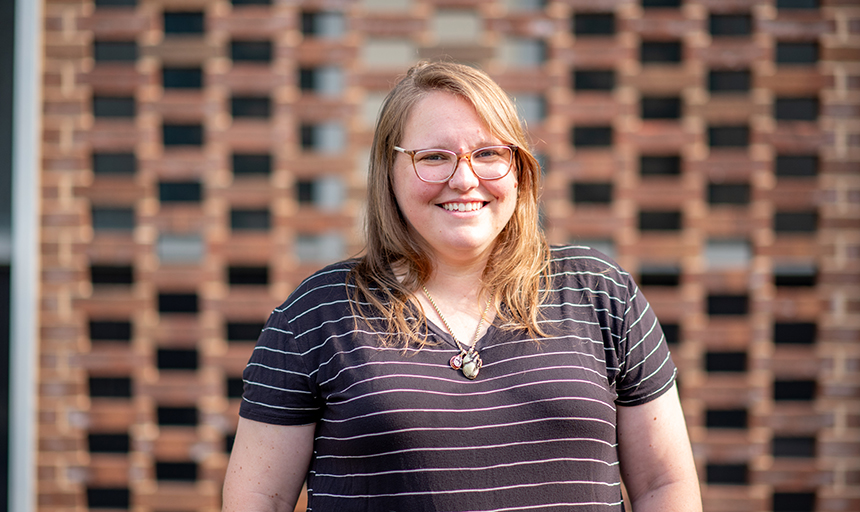
Lauren Kennedy-Metz ’14, who has published extensively on the topic of acute stress, recently returned to her alma mater as an assistant professor of psychology.
Q: What made you choose Roanoke College?
I was drawn to Roanoke College primarily because of its location, its pre-vet program and its Division III athletic programs. In high school, I ran cross country, indoor track and field, and outdoor track and field, and I wanted to find a college where I could still compete at a high level, but also be able to focus on academics and excel in an Honors Program environment. Ultimately, Coach Finn Pincus – the men’s and women’s cross country, indoor and outdoor head coach at the time – is the reason I chose RC.
Q: Who was your mentor at Roanoke College?
I was fortunate to be involved in tons of different programs and opportunities while I was at Roanoke, so I have a number of mentors who made my experience incredible. Coach Pincus was a mentor from an athletic standpoint, but also in many other ways. Academically, I considered Dr. Dave Nichols to be my primary mentor since I had the opportunity to pursue multiple research experiences with him on campus, in addition to traveling to conferences to present my research and publishing our results in a peer-reviewed journal. He also guided me through the psychology and neuroscience curricula. I also considered Dr. Sandee McGlaun a strong mentor of mine as she guided me through the creative writing curriculum. I also worked closely with Dr. McGlaun as a tutor, fellow and head student assistant at the Writing Center, and I presented research with her on the Writing Center’s effectiveness at a regional conference.
Q: What do you love most about your career field?
I love how applicable the field of psychology (and especially the area of acute stress) is to every aspect of life. I never could have predicted that my first real job after graduate school would involve observing open-heart surgeries for hours on end! At the same time, the work I was doing in the hospitals—collecting data from participants (surgeons) about their stress levels while doing a super stressful task (operating on another human)—can be applied to basically any population, so there’s flexibility in which setting I can find myself in and the types of people I can ultimately partner with.
Q: What can you tell readers about your research into acute stress that might help them if they’re ever in an intense moment?
If you can think of a moment when things felt really stressful or intense — whether it was presenting in front of a class, trying to win a conference championship in overtime, slamming on your brakes to avoid a car accident, or coming face to face with a bear while hiking the Appalachian Trail — you can probably appreciate how helpful it is to feel acutely stressed for a brief moment. It can increase how alert we feel, get blood flowing to areas that will enable us to react appropriately, and improve the way we make decisions. But if we don’t handle that situation well, the opposite can happen — we can lose our train of thought, choke on a big play, swerve in the wrong direction or scream in panic. The most important thing is to be aware of how things are changing physiologically and cognitively — and to control the impact of those changes on how you act as a consequence of that. Taking a deep breath and regulating your breathing pattern are natural, intuitive responses to coping with an overwhelming feeling of stress, and for the most part, they work.
Q: What has been your favorite career moment so far?
I’ve really enjoyed collaborating with folks in the Theater Department from both on and off campus to run improv workshops and communication competitions! Danielle Barre of Theatre Roanoke College and I have adapted a two-part program called The Nutshell Games, originally run out of the Center for Communicating Science at Virginia Tech. The goal is to use theater techniques to acknowledge and improve the way we communicate our research with others, both verbally and non-verbally. To many students who have participated so far, it seemed a bit daunting at first, but it always ends up being worthwhile and can go a long way in improving this undertrained skill.
Q: What advice would you give a student interested in your field?
Psychology is such a broad field. Don’t be afraid to explore different areas within it that speak to you!
Q: What is a personal cause that means a lot to you? Why?
I tend to donate platelets somewhat frequently, usually once or twice each month. I feel it’s important for me to do what I can as a donor with the universal blood type because the shelf life of platelets is only five days, so there’s a constant need for them. Also, it’s kind of a lengthy and involved process, so most people are not super likely to volunteer. I do it because I’m not freaked out by needles and I don’t mind sitting still and watching Netflix for a few hours, so I feel that I might as well.
Q: What do you do to unwind or blow off stress?
I enjoy doing all kinds of puzzles. Jigsaw puzzles, sudokus, mahjong – anything that keeps me occupied and challenged.
Q: What brings you joy?
My favorite thing to do is to spend time with my husband, Josh Kennedy-Metz ’11, doing anything at all. We enjoy brewing our own beer, having friends over, playing board games and spending time with our two dogs, Lenny and Regis. Even things I don’t really enjoy doing when alone, like cooking, are fun and exciting with him!